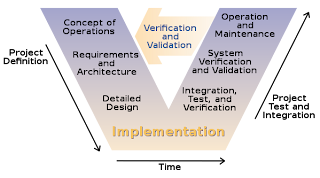In the government domain, the government often contracts for an SI -- system integrator -- whose scope of work is to be an independent evaluator of program plans and progress, an expert adviser to the program executive for risk management and value engineering, and a voice in the project office not beholden to the prime contractor(s), system architect(s), or other implementers.
In large programs, the SI may work simultaneously with multiple prime contractors, overseeing their coordination, communications, consistency in approach, integration of scope, and guarding for "white space" gaps. The SI may even evaluate the integrated program for 'chaos' ... the unintended outcomes of an integrated 'whole'.
In some limited situations, the SI may even develop an interface that seems tagged to white space.
In the commercial domain, a similar scope and role is often given to an "owner's representative".
Necessary or Nice to Have?
Your first thought may be: Another scope of work .... do I really need this for project success? If I don't engage with a service provider for this scope, is this something I am going to have to learn how to do myself, and then allocate my resources to the task? Or, can I get by without it?
Quick answer: It's work that has to be done ... to some level of scope ... so either the PEO or PMO does it with in-house resources, or the PEO/PMO engages an SI who is expert in the scope and presumably not learning on the job on your nickel.
And, by the way, if you do engage with an independent SI, then cooperation with the SI on the part of your architect, prime contractor, and perhaps other stakeholders has to be made part of the Statement of Work (SoW) with those parties. Question worth asking: Does that cooperation come at a cost, monetized or functional?
What's the ROI on the SI engagement
So, whether you are a government program office or a business unit with a large capital project, what's the value-add of having an SI or owner's rep on the scene? Is there a monetized ROI to the cost of a SI, or is the advantage with a DIY model (do it yourself)?
In many respects, it's the insurance model: High impact with low probability, to take a square from the risk matrix. Thus, a low expected value, but nonetheless the impact is judged unaffordable.
The usual risk management doctrine is this: You've got a big (big!) project with a lot of moving parts (different contractors doing different stuff). Get yourself an SI! (At a cost which is usually a small multiple of the expected value, if you think of it in terms of insurance)
SI Scope
The SI is on alert for these 'black swan' impacts that could derail the program, extend the schedule, impact performance, or cost big bucks for rework.
What about agile?
The SI comes on the job early, typically from Day-1, working down the project definition side of the "V" chart (see chart below)
The SI is an advisor to the PEO or PMO regarding threats to the cost, scope, schedule, or quality. If there are value engineering proposals to be fit into the program, the SI is usually the first to evaluate and advise about their applicability.
The SI is an independent evaluator ("red team") of specifications, looking for inconsistencies, white space gaps, sequencing and dependency errors, and metric inconsistencies
The SI is an independent technical reviewer for the PMO of the progress toward technical and functional performance. The SI may provide much of the data for earned-value analysis.
The SI can be an independent trouble-shooter, but mostly the SI is looking for inappropriate application of tools, evaluation of root cause, and effectiveness of testing.
The SI may be an independent integrator of disparate parts that may require some custom connectivity. This is particularly the case when addressing a portfolio. The SI may be assigned the role of pulling disparate projects together with custom connectors.
The SI may be independent integration tester and evaluator, typically moving up the "V" from verification to validation
In a tough situation, the SI may be your new best friend!
'Agile-and-system-engineering' is always posed as a question. My answer is: "of course, every project is a system of some kind and needs a system engineering treatment". More on this here and here.
And, by extension, large scale agile projects can benefit from an SI, though the pre-planned specification review role may be less dominate, and other inspections, especially the red team role for releases, will be more dominate.
V-model
Need to review the "V-model"? Here's the image; check out the explanation here.
Like this blog? You'll like my books also! Buy them at any online book retailer!

